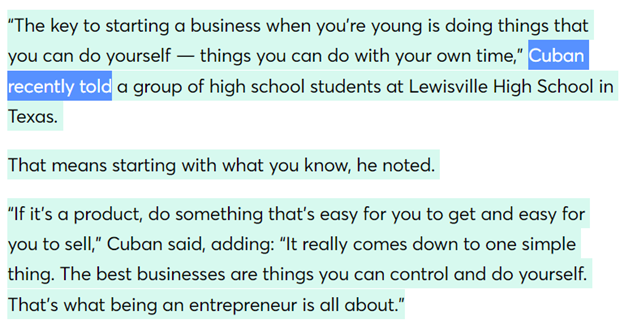|
Getting your Trinity Audio player ready...
|
In the Bitcoin SV (BSV) community, a raging debate has taken place over the years if startups should take investment funds to bootstrap their companies.
I believe the answer to this question is purely subjective and has trade-offs that need to be evaluated before making such an important decision. Blanket statements such as “no startups should take venture capital funds ever” or “every startup needs investment to compete” are unhelpful and fail to address the crux of this question in an ever-changing, constantly evolving economy.

Source: CNBC
Billionaire Mark Cuban gave this bit of business advice to high school students last year, and I believe “Can I do this by myself?” is likely the first question that entrepreneurs should ask themselves before starting. Consistently the businesses that succeed have low costs and high-profit margins. The optimal way to achieve this is to operate the company alone and make lots of sales. Of course, this is easier said than done, but it has been achieved many times and could lead to a lucrative exit if you are bought out or have the ability to expand the business.
The scope of the business is another key factor. If the scope is large and requires infrastructure (technical and/or physical), then investment funds are likely needed. Unless the individual can bootstrap alone, selling equity for startup costs is a necessary step. Otherwise, they would not be able to compete with other entrepreneurs operating in the same space. For example, if one wants to start a mining and data services company, they probably will not be able to compete in their sector without some seed investment.
Specifically, in the digital currency space, some may argue that the invention of Bitcoin fundamentally changes the answer to this question. I believe that to be true to an extent. Given the low barrier to entry to start developing with Bitcoin, and how Internet technologies have progressed to the point where anyone can create a website or launch applications easily, this has enabled more solo business opportunities.
That stated, the scoping question still applies. If an artist is just trying to sell NFTs, then they can likely go at it alone. If a developer is trying to tokenize food products on the blockchain from farm to table, then that massive task cannot be reasonably accomplished alone.
A counterargument to the scoping caveat could be that the entrepreneur can limit the project scope such that investment is not required to start. Again, this is a subjective take. Factors such as the chosen business sector, current competition, and market interest rates are relevant. If your competition is Google and interest rates are 0%, then trying to take them down alone is not going to work out, as the competition has billions of dollars of assets and access to even more via low capital costs. Yet, if one is pioneering in a brand-new sector with low-interest rates, then perhaps a bank loan is sufficient.
In conclusion, the question of whether to take an investment to start your business depends on too many factors to definitively answer. However, the invention of Bitcoin does, without a doubt, increase the opportunities and upside for entrepreneurs to start and succeed alone.
Watch: Blockchain Venture Investments: Driving Utility for a Better World

 02-22-2026
02-22-2026 




